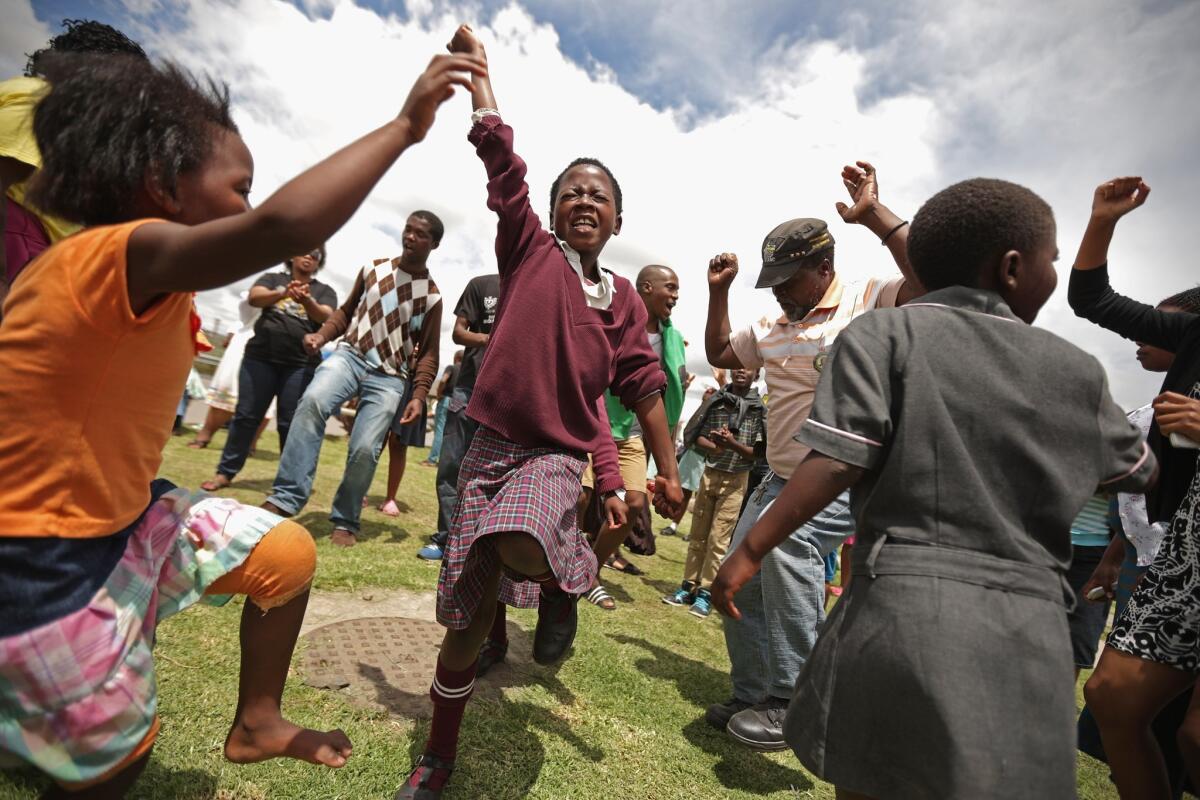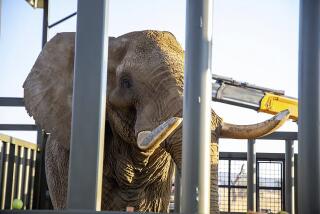As Mandela’s home village prepares for funeral, some are left out

QUNU, South Africa -- A fine strong bull was chosen in Qunu, Nelson Mandela’s home village, to accompany him on his final journey. It must be slaughtered before Sunday’s funeral, so that it may go with him to the other side, according to traditional belief.
As Mandela was taken from Pretoria, where he lay in state for three days, to his home village of Qunu in the Eastern Cape, the chief of the clan, his grandson Mandla Mandela, and other elders were present.
Dozens of family members were waiting at Nelson Mandela’s homestead to receive his casket, where tradition called for the house to be freshly painted before he arrived, according to Qunu residents. A group of elders kept vigil with his body all night Saturday.
In the morning, according to Xhosa tribal tradition, family members were to wash all their clothes to ensure the ill luck of the death was washed away.
Mandela, a revered symbol of racial reconciliation worldwide, the first black president of South Africa and a Nobel Peace Prize recipient, died Dec. 5 at age 95.
Mandela’s homestead, behind a grand set of gates, lies in the heart of Qunu, set amid the rolling green mist-swathed hills of the Eastern Cape. Dogs, cows and chickens wander among the brightly painted houses, some with carved front doors.
Tradition is important in the village, and that’s why the local king, Buyelekhaya Dalindyebo, is involved in the funeral, despite a spate of controversies.
But one tradition that locals say has been forgotten is the practice of everyone in the village attending funerals. Most villagers have not been invited to Mandela’s, and, if they care to see it, must watch the service on a big screen on a nearby hill.
“We feel sad in that we’re not going,” said Siphokazi Gqabuntshi, 18, nodding in the direction of the hill where the state funeral will take place.
Many Qunu villagers have fond memories of Mandela walking and greeting people.
The Mandela house is low on the hill, and farther up, a gigantic marquee has been erected for the 4,500 guests who will attend the funeral, with its 21-gun salute and air force flyover.
Even farther up the hill, seating has been erected at the family burial site where the remains of Mandela’s children were interred this year after a family quarrel over their resting place, a dispute so bitter that it ended up in court. Behind the court battle was a struggle between two factions of the family to have Mandela buried in their village.
Gqabuntshi believed Mandela would have been unhappy at the idea of villagers being excluded from the funeral.
“He would not like to see us not going to his funeral. He was not like that. He was a kind person, a loving person,” she said. “I think things are changing since he died. These people left don’t like us.” There was also concern among South Africans that former Archbishop Desmond Tutu, a friend of Mandela’s, might not attend the funeral.
Tutu announced he had not received an invitation nor any indication he was welcome at the funeral. Tutu was an important figure in the liberation struggle, mobilizing church-goers and believers to support the fight against apartheid.
“It’s very sad. Desmond Tutu played a major role,” said Qunu resident Wisizwe Billie, 36, a schoolteacher. Tutu has been a critic of the government in recent years.
Tutu eventually announced Saturday that he was going to attend the funeral, after the government got in touch with his office.
Security was stepped up Saturday in Qunu in preparation for the funeral, with a heavy presence of police and soldiers.
As the arrival of Mandela’s coffin was cheered Saturday in the streets of Mthatha, and later in Qunu, a sense of finality drew closer.
“We now understand we won’t see him anymore. Finally he has gone now,” said Billie.
Ondela Ngcebetshana, who had been one of Mandela’s neighbors, said people had better be on their best behavior now that he is dead. According to African traditional belief, he will join his ancestors and see everything that his people do.
“We believe he’s going to be our representative in the other world,” said Billie. “Even when he is in the ground [the family] will still talk to him. Some of the things he likes can be put [in the grave] with him.”
“He’ll be watching us from above, everyone in the world,” said Ngcebetshana. “I think we need to keep our hearts clean for him. I think that will be a big gift to him.”
ALSO:
Death toll from Philippines typhoon surpasses 6,000
Chinese lunar probe makes first soft landing on moon since 1976
North Korea leader’s purge looks like China’s Cultural Revolution
Twitter: @latimesdixonrobyn.dixon@latimes.com
More to Read
Sign up for Essential California
The most important California stories and recommendations in your inbox every morning.
You may occasionally receive promotional content from the Los Angeles Times.










